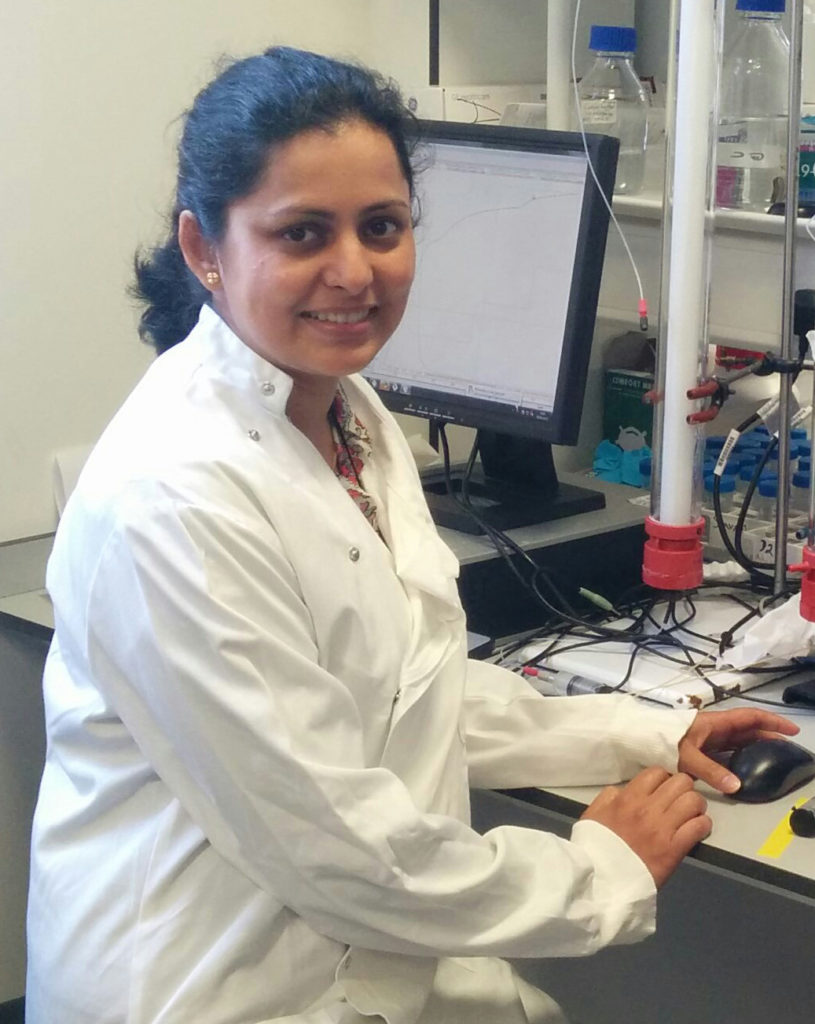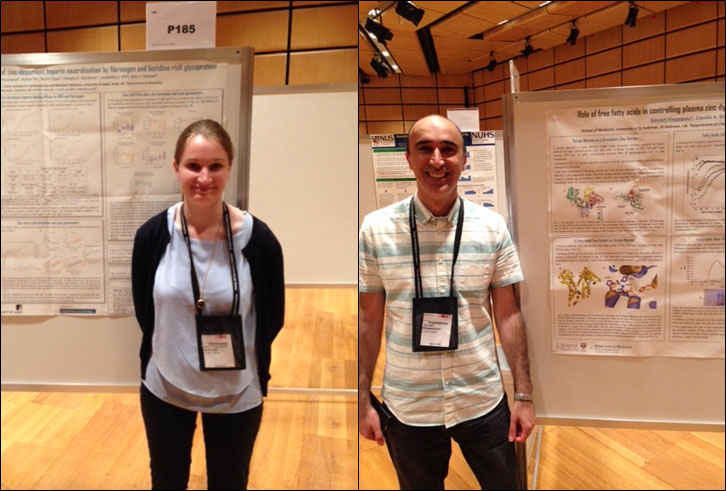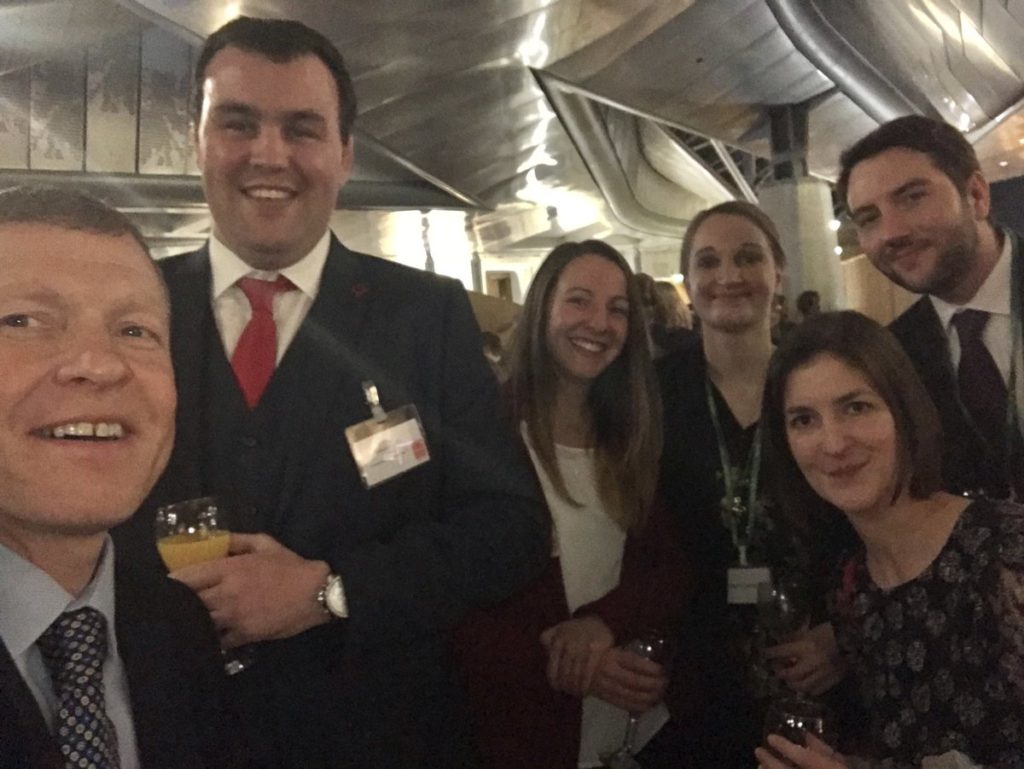Dr Alan Stewart represented the Metal Ions in Medicine team at the Obesity and Diabetes Conference in Rome held between 25th-26th Februray 2019. Whilst there he gave a keynote talk titled “Influence of free fatty acids on plasma zinc handling by albumin: Impact on coagulation in diabetes”. As an organising committe member he would like to thank all who attended and presented during the meeting.
 ajs21
ajs21
Quantitative proteomic changes in dendritic cells – paper to be published in Scientific Reports
Dendritic cells are key immune cells that respond to pathogens and co-ordinate many innate and adaptive immune responses. Dr Swati Arya and Dr Dagmara Wiatrek-Moumoulidis from the Stewart group, together with Dr Simon Powis and researchers from the Mass Spectrometry team in St Andrews (led Dr Sally Shirran) have used SWATH-MS to quantitively measure proteomic changes that occur in monocyte-derived dendritic cells (moDCs) following activation by lipopolysaccharide (LPS). A moDC library of 4,666 proteins was generated and proteins were quantified at 0, 6 and 24 h post-LPS stimulation using SWATH-MS. Functional annotation of proteins exhibiting significant changes in expression between the various time points led to the identification of clusters of proteins implicated in distinct cellular processes including interferon and interleukin signalling, endocytosis, the ER-phagosome pathway and antigen-presentation. This study provides new detailed insight into the global proteomic changes that occur in moDCs during antigen processing and presentation and further demonstrate the potential of SWATH-MS for the quantitative study of proteins involved in cellular processes. This work will be published in the online open-access journal, Scientific Reports.
Action Against AMD Launch Event
On 26th November Dr Alan Stewart attended a networking dinner at the Royal College of Surgeons in Edinburgh to help launch a new charity focused on developing a cure for age-related macular degeneration (AMD), a debilitating eye disease that affects millions of people worldwide. In the UK alone there are more than 685,000 people with significant sight loss as a consequence of late-stage AMD. The new charity has been founded by four leading site loss charities, Blind Veterans UK, Fight for Sight, the Macular Society and Scottish War Blinded.
University of Virginia (UVA) Visit and Proteomics-2018 Conference
During a recent trip to the USA, Dr Alan Stewart visited the laboratory of Prof Wladek Minor in the Department of Biochemistry and Biophysics at the University of Virginia – Charlotteslville and on the 15th November gave a seminar there entitled “Allosteric regulation of plasma zinc dynamics by free fatty acids: A potential driver of cardiovascular complications in disease states”. He then went on to Dallas, Texas to attend the Proteomics-2018 conference (19th-20th November) where he gave an invited talk entitled “The hydroxyapatite interactome in age-related macular degeneration”.
“Dragons Den” Success – £5k funding for new pilot project
 Congratulations to Dr Swati Arya who was awarded a £5,000 grant at the School of Medicine Research Away Day held at the Byre Theatre. Swati made a successful pitch for the cash at a Dragons Den-style event. The funding will be spent on a new collaborative pilot project (with Dr Peter Caie and Dr Alan Stewart, both University of St Andrews and Dr Margaret Dunne, Trinity College Dublin) focussed on identifying early biomarkers for esophageal cancer using SWATH-MS. Swati also gave a talk at the event entitled “The hydroxyapatite interactome in age-related macular degeneration”.
Congratulations to Dr Swati Arya who was awarded a £5,000 grant at the School of Medicine Research Away Day held at the Byre Theatre. Swati made a successful pitch for the cash at a Dragons Den-style event. The funding will be spent on a new collaborative pilot project (with Dr Peter Caie and Dr Alan Stewart, both University of St Andrews and Dr Margaret Dunne, Trinity College Dublin) focussed on identifying early biomarkers for esophageal cancer using SWATH-MS. Swati also gave a talk at the event entitled “The hydroxyapatite interactome in age-related macular degeneration”.
Frontiers in Cardiovascular Biology (FCVB), Vienna – Siavash and Amelie present their work
The Stewart group are grateful to the organisers of the recent Frontiers in Cardiovascular Biology (FCVB) meeting in Vienna, Austria, which was held between 20-22nd April. Dr Alan Stewart, Dr Siavash Khazaipoul and Amelie Sobczak were in attendance for the three-day conference and both Siavash and Amelie (pictured below) presented posters on their work.
Heparin neutralisation review accepted for publication in ATVB
The glycosaminoglycans (GAGs) heparan sulfate, dermatan sulfate and heparin are important anticoagulants that inhibit clot formation. Unfractionated heparin, low molecular weight heparin and heparin-derived drugs are often the main treatments used clinically to handle coagulatory disorders. Such agents are neutralised endogenously by a wide range of proteins to control coagulation. In a recent article by Amelie Sobczak, Samantha Pitt and Alan Stewart, a review of GAG neutralisation, the proteins involved and the molecular processes that contribute to the regulation of anticoagulant GAG activity is presented. The review will be published in an upcoming issue of the journal, Arteriosclerosis, Thrombosis, and Vascular Biology.
Plasma proteomics study published in “Experimental Eye Research”
Age-related macular degeneration (AMD) is a common cause of site loss associated with the formation of proteinous deposits that block circulatory exchange with the retina. The factors that contribute to deposit formation are not well understood. Recently, the presence of spherular hydroxyapatite (HAP) structures within these deposits was discovered to which several AMD-associated proteins were bound. This suggests that protein binding to HAP represents a potential mechanism for the retention of proteins and thus deposit formation.
As part of a Fight for Sight-funded study, the Stewart lab set about identifying circulating plasma proteins that may contribute to deposit formation through binding to HAP using SWATH-MS proteomics. The study, in collaboration with Dr Imre Lengyel (Queen’s University Belfast) utilised blood plasma samples taken from phenotyped late-stage AMD patients (some of whom carry an “at risk” genetic variation, CFH T402H in their DNA). From a library of 242 identified HAP binding plasma proteins, significant quantitative differences in the abundance of 32 HAP-binding proteins (p<0.05) between the two homozygous groups (“normal” vs “at-risk”). The concentrations of six proteins (FHR1, FHR3, APOC4, C4A, C4B and PZP) in the HAP eluted fractions and whole plasma were further analysed using ELISA and their presence in sections from human cadaver eyes was examined using immunofluorescence.
The published article is available here.
Fatty acid research highlighted by BHF’s “Heart Matters” Magazine
Research from the Stewart lab into the role that certain fats may play in pathological blood clotting has been highlighted by the BHF in their “Heart Matters” magazine. A link to the article can be found here.
BHF Annual Parliamentary Reception 2018
On the 31st of January Dr Samantha Pitt, Dr Alan Stewart, Amy Dorward, Amelie Sobczak and Gavin Robertson represented the Metal Ions in Medicine Group at the British Heart Foundation Scotland’s Annual Reception, which took place in the Scottish Parliament Building in Edinburgh. The event, attended by fundraisers, researchers and politicians, highlighted the great work of the BHF in funding cutting-edge research, informing policy and promoting public awareness of its activities. During the meeting they bumped into local MSP and leader of the Scottish Liberal Democrats, Willie Rennie. The reception was followed by a private dinner hosted by the Head of BHF Scotland, James Cant that Sam attended.
